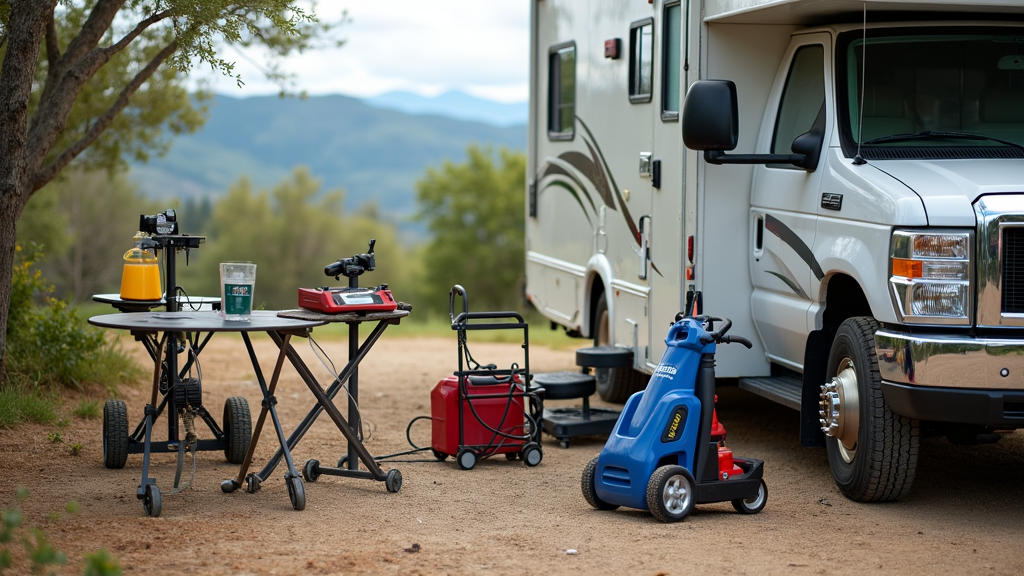I have spent many years on the road, cherishing the freedom and adventure that come with owning an RV. My personal experience has taught me that taking good care of an RV not only extends its life but also creates a safe and worry‐free travel experience. In this article, I share my RV maintenance to-do list with clear guidance on regular upkeep and a detailed maintenance schedule for different types of RVs, including fifth wheels.

What are the most overlooked RV maintenance items?
One of the most overlooked yet crucial RV maintenance tasks is checking and sealing roof seams and window seals. Over time, small leaks can develop, leading to significant water damage and mold growth. Another frequently ignored area is tire care—keeping tires properly inflated and checking for wear prevents blowouts on the road. Lastly, failing to maintain the battery and electrical system can result in unexpected power failures, especially when boondocking. Regular checks and preventive maintenance in these areas can save RV owners thousands in repairs.
Table of Contents
- Essential Routine RV Maintenance
- Regular Maintenance Tasks for RV Systems
- Understanding Maintenance Frequency
- Fifth Wheel RV Maintenance Schedule
- Advanced Tips for Effective RV Maintenance
- Budgeting and Planning for Maintenance
- Frequently Asked Questions
- Final Thoughts on RV Maintenance
Essential Routine RV Maintenance
Keeping an RV in top shape starts with a disciplined routine. I stick to a schedule that includes regular cleaning, careful inspections, and mechanical check-ups. Washing down both the interior and exterior not only keeps the RV looking great but also helps fight corrosion, dirt buildup, and potential leaks. Routine checks mean that every fluid—whether it is oil, transmission fluid, or coolant—is replaced as needed whether a motorhome or tow vehicle. . This careful, ongoing care is vital for both safety and longevity.
Every trip begins with a quick yet thorough assessment of the engine, brakes, and transmission. Before I set out for any long adventure, I verify that these mechanical components are operating properly. I also take time to look over the electrical system to ensure that there are no unpredictable hitches along the way. This methodical approach might seem basic, but it forms the backbone of my maintenance plan, keeping unexpected problems at bay.
Regular Maintenance Tasks for RV Systems
An RV’s different systems demand individual attention. I break down maintenance into key areas: electrical, plumbing, and tire care. For instance, the battery, inverter, and generator all benefit from periodic testing, especially when planning a trip to remote areas. I make sure every component is in tip-top shape so that no single failure spoils my plans. When the RV is in storage the generator gets exercised monthly.
The plumbing system also gets special care. I often clean water filters and check for leaks, ensuring water quality remains high and that clogs don’t form. Likewise, routine efforts to replace filters and verify proper ventilation keep the heating and cooling systems operating as they should, regardless of the weather. Tire checks are another crucial area. Maintaining the recommended tire pressure and looking for signs of wear prevent mishaps and save money by avoiding costly repairs.
Understanding Maintenance Frequency
A common question among RV enthusiasts is just how often maintenance should be performed. From my experience, a blend of weekly (for full timers), monthly, and annual tasks seems to work best. Weekly routines include tasks like cleaning, checking fluid levels, and ensuring that tire pressure is ideal. These small, regular actions provide an immediate safety net and keep the RV ready for spontaneous adventures.
On a monthly basis, I expand my checks to include thorough testing of the electrical systems and cleaning of water filters. Once a year, however, I devote extra time to an all-in-one inspection that covers the roof, seals, and all critical mechanical components. This annual check-up is very important in catching minor issues before they develop into larger, more expensive repairs.
Fifth Wheel RV Maintenance Schedule
Fifth wheel RVs have their own unique needs. Given their size and the combination of trailer and motorhome features, they require a slightly altered approach to maintenance. I pay special attention to the hitch and connection system, checking them every few weeks to make sure the locking mechanism is secure. This extra care is really important for safe travel and helps me avoid potential breakdowns.
When I owned a fifth wheel In addition to regular inspections of the interior and exterior, I had a semi-annual appointment with a professional to review the towing system and frame. This all-in-one review also encompassed electrical and plumbing systems, as well as tire condition and wheel bearings. Planning these inspections during off-peak travel seasons ensures that maintenance never disrupts my holiday or summer trips.
Advanced Tips for Effective RV Maintenance
Apart from the basics, I have learned that a few advanced tips can really step up the overall performance of an RV. Being proactive by addressing minor issues immediately prevents larger problems from emerging later. I keep a well-equipped toolkit that includes specialized cleaning supplies (Release Cleaner is a favorite), lubricants for moving parts, and handy diagnostic tools. With such resources available, I can deal with issues the moment they arise, saving both time and money.
Investing in high-quality maintenance products is another valuable tip. I often use top-grade sealants to fix minor roof leaks and keep extra fuses and bulbs in reserve. In today’s digital age, using maintenance logs and scheduling apps has become a game plan for me. These digital reminders ensure that I never miss an important check-up and keep my RV running efficiently even on the go.
Budgeting and Planning for Maintenance
Money matters when it comes to proper RV care. I allocate a portion of my monthly budget specifically for maintenance needs. This fund covers both regular servicing and unplanned repairs. Such forward-thinking financial planning not only helps me avoid sudden burdens but also maintains the RV’s overall reliability and resale value.
Having a clear and organized maintenance schedule means that I am always prepared for any major servicing needs. I routinely collect estimates from trusted service centers and keep detailed records of every repair and inspection. This organized approach not only builds confidence in my travel plans but also ensures that my RV remains a safe haven on wheels throughout every adventure.
Frequently Asked Questions
What regular maintenance should be done on an RV?
I stick to a regimen that includes cleaning, mechanical inspections, and system checks. I review the engine, brakes, and transmission; keep an eye on fluid levels; and tidy both the inside and outside areas. Additionally, I test the electrical, plumbing, and HVAC components periodically to make sure everything functions as it should. The generator is exercised monthly.
How much maintenance does an RV need?
An RV should be subject to weekly cleaning and fluid checks, with additional monthly and annual inspections for more detailed evaluations. This balanced approach ensures that both immediate and long-term issues are addressed promptly, keeping the vehicle safe and travel-ready at all times.
What is the maintenance schedule for a fifth wheel RV?
Fifth wheel RVs need enhancements to the basic schedule. I check the hitch and connection every few weeks and undertake a detailed interior and exterior review each season. Semi-annual professional inspections covering the towing system, mechanical parts, and other key components ensure that the fifth wheel remains dependable over the long haul.
Want to keep your RV in top shape and avoid costly repairs? Start by creating a simple maintenance routine today! Don’t let small issues turn into major problems—stay ahead with a smart upkeep plan!
Final Thoughts on RV Maintenance
Keeping an RV in great condition demands careful planning and consistent effort. I have learned that sticking to a regular routine combined with detailed periodic checks makes all the difference. An all-in-one approach not only boosts the longevity of the vehicle but also ensures safety and efficiency on every trip.
Whether you are new to RV life or have been traveling for years, a clear maintenance plan is really important. I encourage every RV owner to maintain a record of inspections and repairs, budget prudently for upkeep, and invest in quality products. Paying attention to these details means fewer unexpected breakdowns and a smoother travel experience overall.
Every road trip brings new memories, and a well-maintained RV serves as a trustworthy companion. Take the time to review and update your maintenance plan regularly, and enjoy the freedom of the open road with confidence and peace of mind.
About the Author
Jim has 3.5 years of experience living and traveling full-time in an RV. From “moochdocking” with family and friends to navigating the financial intricacies of RV life, he shares practical advice rooted in firsthand experience. His goal is to help fellow adventurers embrace the RV lifestyle with confidence and ease.

Routine RV maintenance is the key to preventing costly repairs and ensuring a smooth journey on the road. While many focus on the basics like tire pressure and fluid levels, it’s interesting to consider how factors like climate and terrain impact long-term wear and tear.
For those who travel full-time, how do you adapt your maintenance schedule based on different environments—such as high humidity, extreme cold, or desert conditions?
Great question! You’re absolutely right—climate and terrain play a significant role in RV maintenance. As someone who’s traveled full-time in an RV for over 3.5 years, I’ve learned to adapt my maintenance schedule to suit the environment. Here are some tips:
High Humidity: In humid climates, mold and mildew can become issues. I make it a point to check and maintain seals around windows and doors more frequently to prevent leaks. Running a dehumidifier or using moisture absorbers helps protect the interior from dampness and potential damage.Extreme Cold: Cold weather can be tough on batteries and plumbing. I winterize the plumbing system if I’m staying in freezing temperatures for an extended period. It’s also crucial to check the antifreeze levels and ensure the heating systems, like the furnace and tank heaters, are working properly.Desert Conditions: In hot, dry climates, tire pressure fluctuates more frequently, so I check it more often to avoid blowouts. UV exposure can also cause seals to dry out and crack, so I inspect and condition them regularly to maintain flexibility.General Tip: Regardless of the environment, I keep a flexible maintenance schedule. I perform more frequent inspections when moving between drastically different climates, ensuring the RV is ready for the next leg of the journey.
Your observation about the impact of terrain and climate is spot on—adapting maintenance habits based on the environment not only prevents costly repairs but also keeps the RV journey safe and enjoyable. Thanks for bringing up such a thoughtful point!
If you have any other questions or need more detailed tips for a specific climate, feel free to ask!